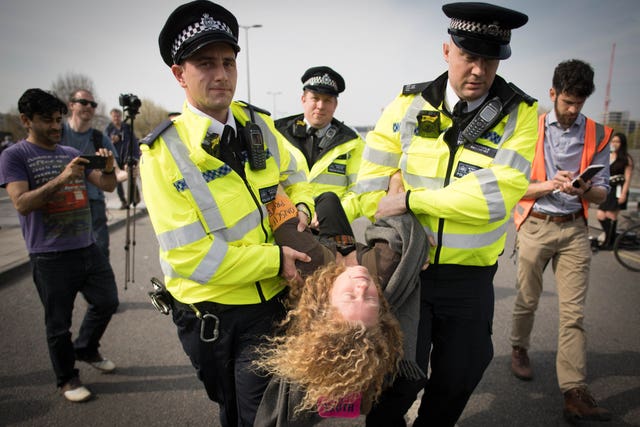Policing protests in London is draining frontline resources on a greater scale than the London Bridge terror attack and Grenfell tragedy in 2017, figures suggest.
Since April this year, the Metropolitan Police has pulled frontline officers away from their normal duties to tackle protests more times than when the force was dealing with the 2017 atrocity and tower block disaster.
The practice, called abstraction, involves frontline officers moving from an eight to a 12-hour shift pattern, enabling some to be moved to other duties.
This has happened for a total of 83,000 shifts since April this year, compared to around 80,000 for the same period in 2017.
Speaking ahead of two weeks of protest action planned in the capital by climate change group Extinction Rebellion, Met Assistant Commissioner Nick Ephgrave warned communities will notice the strain on police.
We come in peace: Extinction Rebellion message to government and response to Met Police statement.https://t.co/Emrxx122c8
— Extinction Rebellion UK ?️ (@XRebellionUK) October 2, 2019
Mr Ephgrave said: “There is a cost to all of this. There is a cost to communities in London, to your average Londoner.
“There is a cost to our people, and there is a cost to business.
“It’s undoubtedly the case that we will not necessarily be able to deliver a service to the level we would want to, right across London, during this two-week period.
“The same amount of work is going to have to be done by fewer people working longer shifts with fewer breaks.
“That makes life much more difficult for our people. It means they might have to make compromises around which things they go to, how long they spend at incidents.
“I think communities may notice that.
“Whether it’s our ability to deal with street-based violence, whether it’s our ability to investigate things like domestic abuse, or any other crime you care to mention, there will be a cost.”
Extinction Rebellion is starting two weeks of protest action on Monday, occupying 12 sites in London.

Similar mass demonstrations by the group in April saw around 1,100 people arrested and a policing operation that cost £16 million.
Mr Ephgrave wrote to former policing minister Nick Hurd recommending a number of changes to public order legislation in the wake of the operation, including potential banning orders for repeat offenders.
He said: “The idea is that if we have people who are habitually coming to protest unlawfully then it would be helpful potentially to have the ability to prohibit them from so doing.”
Lawyers criticised the Met for pressing ahead with court action against protesters involved in the spring action, so far prosecution papers have been served to around 850, and more than 250 have been prosecuted.
But Mr Ephgrave insisted it is right to push ahead with court action.
Tens of thousands of people in countries across every continent will demand governments take immediate & decisive action on the climate & ecological emergency. In the UK, @XRebellionUK will converge on Westminster.#EverybodyNow ? #InternationalRebellionhttps://t.co/R3nsAAoFK9
— Extinction Rebellion ⌛️ (@ExtinctionR) October 1, 2019
He said: “Were we to allow unlawful protest to be tolerated it would encourage others to do the same sort of thing and it’s difficult to see where that would end.
“It’s very dangerous if you start excluding certain types of protest from applying the law.
“It shouldn’t be taken lightly.
If you want to break the law and get yourself arrested, whilst that particular activity might cost you a day or a few hours, there are other consequences that come.
“You could potentially end up with a criminal record.”
An Extinction Rebellion spokesperson said: “We appeal to the humanity of the Government and authorities to remember that we are non-violent protesters.
“We appeal to their humanity to remember that we are facing an unprecedented global emergency.
“Many are losing their lives already and we are called upon as human beings to act now.
“We also say to them, the people of London and every other person that we cannot do this without them. We invite them to join us, along with the doctors, teachers, scientists, the young and the old, on the streets from October 7.”






